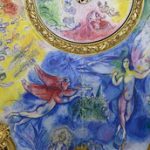 Revisiting Russian-speaking artistic (e)migration
Revisiting Russian-speaking artistic (e)migration
online, Apr 7–08, 2022
Deadline: Jan 15, 2022
Revisiting Russian-speaking artistic (e)migration, 1900–1939
Workshop organized by the research project Relocating Modernism: Global Metropolises, Modern Art and Exile (METROMOD) based at the LMU Munich
Deadline: 15 January 2022
The 20th century was marked by several significant migratory flows from the (former) Russian Empire, which resulted in many artists living and working abroad. These diverse relocations, subsumed under the term “Russian emigration”, were already present at the turn of the century, increased drastically after the Russian Revolutions of 1905 and especially 1917, and intensified further in the wake of the Second World War. To date, research on Russian-speaking communities abroad has been dominated by literary studies, with certain conceptions being extended to the field of art history. Arguing that there were significant differences in their (e)migration experiences based on the respective artistic medium, this workshop, in contrast, seeks to narrow the focus to visual artists. At the same time, it proposes to extend the time span from 1900 – thus including migratory flows before the “first emigration wave” – to 1939, before another wave of emigration was triggered as a result of the Second World War. Particular attention is to be paid to dynamic changes in migrant communities that may have occurred after the October Revolution (1917) and the Civil War (1917–1922).
Following METROMOD’s research focus on global metropolises as important destinations for exiled artists – in particular Bombay (now Mumbai), Buenos Aires, Istanbul, London, New York, and Shanghai – the workshop aims, furthermore, to highlight the geographic scope of Russian-speaking artistic migration beyond Europe and the USA. Of particular interest are “decentering” perspectives on migration from the (former) Russian Empire that explore important cities of arrival or transit, such as Istanbul, Cairo, Tunis, Shanghai, Tokyo, Rio de Janeiro or Bombay. By bringing together diverse case studies and comparative approaches (considering, for instance, the differences between such organizations as Unions of Russian Painters that were founded in several exile destinations), we seek to explore how different environments have shaped artistic ideas, production, networking, and institutionalizing. Key questions concern the reciprocal interactions between urban environments, migrant communities/exiled artists, and modern art: How did migrant/exiled artists come into contact with local cultures and aesthetics? How did the respective urban topographies affect artistic networking or communication? In turn, how have migrant/exiled artists shaped urban spaces? To what extent did their experiences in transit countries impact the development of modern art in the West after their relocation to destination cities like Berlin, Paris, or New York? Furthermore, the workshop seeks to shed light on the ethnocultural and religious diversity of these artists and thus illuminate the heterogeneity of migrant “communities”, challenging the notion of “Russian emigration”.
The workshop aims at rethinking, differentiating and better understanding the complex phenomenon of Russian-speaking artistic (e)migration while challenging the Eurocentric concept of Modernism in general. We invite contributions that explore various forms of mobility, production, activities, and networks of Russian-speaking artists and open new perspectives on the role of global metropolises as transnational places for artistic encounters, which on their part changed the development of modern art. We welcome proposals from researchers at any stage of their careers.
Possible paper topics include, but are not limited to:
– Local and global artistic networks
– Supportive networks of institutions, art patrons, gallerists
– Places of sociability where ideas and collaborations emerged (bars, clubs, hotels, restaurants etc.)
– Examples of how cities shape identities of émigrés and of how émigrés shape the cities (by reinventing landscapes for instance)
– Remembrance/traces of exile
– Methods (mapping, walks etc.)
– Belonging and place-making in city/neighborhood spaces
– Migrant/exiled artists as agents of art and cultural transfer
– Comparative analysis of pre-and post-revolutionary dynamics
– Ethnicity, religion and gender
To submit a proposal for a 20-minute contribution, please send an abstract of no more than 300 words and a short bio of up to 100 words in a single PDF document to the workshop organizers Ekaterina Aygün (ekaterina.aygun@kunstgeschichte.uni-muenchen.de) and Mira Kozhanova (mira.kozhanova@uni-bamberg.de) by 15 January 2022. Selected applicants will be notified by 11 February 2022. The working language of the workshop will be English. For inquiries, feel free to contact Mira Kozhanova.
For further information, please visit: https://metromod.net/2021/11/26/call-for-papers-revisiting-russian-speaking-artistic-emigration-1900-1939/

Leave a Reply
You must be logged in to post a comment.